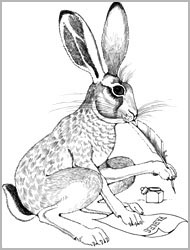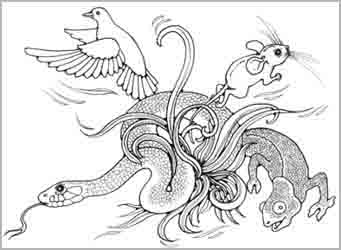|

John
Gay wrote a tragedy called 'The Captives', which was performed at Drury
lane in January 1724. The Author also read it to the Princess of Wales.
Impressed, she asked him to write some fables for her infant son, the
Duke of Cumberland. In 1727, after some delay in the preparation of
the illustrations and plates by John Wootton the animal painter and
Kent, the architect, Tonson and Watts published Volume 1 of the Fables.
The most noted edition of the Fables, with wood engravings by Thomas
Bewick, appeared in 1779. Gay is now principally known as the author
of 'The Beggar's Opera'. For some time his Fables had been just as popular,
especially with the Victorians.
Gay completed a second volume of Fables in the year
of his death in 1732 and they appeared in 1733. These poems are much
longer and 'mostly on subjects of a graver and more political turn’.
John Gay was born in Barnstaple, Devon, and baptised on 16th, September
1685. He was the youngest child of William Gay and Katherine Hanmer.
They also had an older son and two daughters, another daughter dying
shortly before John's birth. The family were descended from the Le Gays
of Oxford and Devonshire and, although not wealthy, were comfortably
off. Gay's mother died in 1694 when he was only ten. His father died
the next year. One of four paternal uncles took charge of the orphaned
family. The elder brother, Jonathan, joined the army and rose to captain
before dying in 1709 at the age of 31, and the two sisters, Catherine
and Joanna, married.
After a grammar school education John Gay was apprenticed
to a silk mercer in London. He gave up the vocation, or was dismissed,
and returned to Barnstaple. He stayed with his mother's brother, the
Rev. John Hanmer, a nonconformist minister, before returning to London.
Some poems discovered in the minister’s favourite chair a century
later were attributed to Gay. Authorship is not certain and these seem
to be the only work from that period of his youth. Though in London
for some while, little is known about how Gay survived until the publication
of his poem 'Wine' in 1703. The poet’s friendly and compliant
nature later earned for him such friends as Alexander Pope, Jonathan
Swift and Dr. John Arbuthnot.
In 1712 Gay obtained the post of secretary to the
Duchess of Monmouth, wife of Charles II's illegitimate son who had been
beheaded for trying to overthrow James II. This eccentric and difficult
employer dispensed with his services in 1714. In the middle of the year,
owing to the influence of his friends, Gay was appointed secretary to
Lord Clarendon who was about to visit the Court of Hanover. On payment
of £100, Gay promptly used it to buy a sumptuous outfit to impress
the German court. On the 1st, August Queen Anne died and Lord Clarendon
and his secretary were recalled. Gay was once again left without a patron
or employer.
From then on Gay willingly gave up his independence to become the protégé
of anyone indulgent enough to support his indolent habits and liking
for good food and wine.
By his own admission, Gay was fat and disliked exercise.
It was probably the combination of the two that hastened his comparatively
early death. Sooner than walk a short distance, he always made sure
a coach was at his disposal when in London.
Gay could not cope wisely with penury or the sudden
acquisition of wealth. Against all good advice, he invested the considerable
fortune of £20,000 in South Sea stock. He lost it all when the
bubble burst in 1720. Then came the success of his play, 'The Beggar's
Opera' with music by Johann Pepusch. It was staged by John Rich at Lincoln's
Inn Fields in 1723.
Its profits enabled Rich to build the first theatre
in Covent Garden. Though not well remunerated, John Gay became famous,
as well as notorious with those who claimed the play was immoral. The
real profit came from 'Polly', its sequel. The Lord Chamberlain, under
instruction from Sir Robert Walpole, prohibited its performance. As
a consequence, printed copies of the text sold at a phenomenal rate.
Given Gay's easy and eager to please nature, it is unlikely he courted
infamy of any description. Even the scandalous play 'Three Hours After
Marriage', though attributed to him, was jointly written by Pope and
Arbuthnot as well.
Gay was able to use language in a fluid and natural
way all levels of society understood. Many of his moral stands did vary
in height, although he does consistently declare his abhorrence of butchers.
In 1723, Gay's health deteriorated severely. With the attention of Dr.
Arbuthnot and the Duke and Duchess of Queensbury, his last patrons,
he survived.
Gay died in 1732 at the town house in Burlington
Gardens of the Duke and Duchess. According to Dr. Arbuthnot 'of an inflammation
and I believe at last a mortification of the bowels.'
Due to the management of Gay's money by the Duke
of Queensbury, the poet left £6,000. As Gay made no will and never
married, the money and the proceeds from a theatrical benefit went to
his widowed sisters, Catherine Baller and Joanna Fortescue.
The Duke and Duchess of Queensbury had a memorial
erected to John Gay in Westminster Abbey where he was buried. It was
in Poet's Corner until 1936 when it was removed with some others after
the discovery of two medieval paintings of St. Christopher and St. Thomas
behind the wall they stood against. It is now in the Triforium, unfortunately
out of the public view.
Alexander Pope's lines on the monument give an idea of Gay's character
from someone who knew him well:-
Of Manners gentle, of Affections mild;
In Wit a Man; Simplicity a child:
With native Humour temp'ring virtuous
Rage,
Form'd to delight at once and lash
the Age:
Above Temptation, in a low Estate,
And uncorrupted, ev'n among the Great;
A safe Companion, and an easy Friend,
Unblam'd thro' Life, lamented in thy
End.
These are thy Honours: not that here
thy Bust.
Is mix'd with Heroes, or with Kings thy
Dust;
But the Worthy and the Good shall say,
Striking their pensive bosoms _ Here
lies GAY.
Gay's two line epitaph to himself probably says more about the poet
and playwright:-
Life is a jest; and
all things show it,
I thought so once: but now I know it.
Jane Palmer 1984
The illustrator
wishes to thank the following:
The National Galleries of Scotland, who own the portrait of John Gay
by William Aikman from which the title page illustration was taken;
The Dean and Chapter of Westminster for supplying the photograph of
John Gay's memorial and other information, both of which were invaluable;
The Guildhall Library, who own the original picture of Gresham College
in Bishopsgate Street, from which the illustration of Fable 16, 'The
Pin and the Needle' was copied.
Other
Works by John Gay
Wine
1708
The Mohocks 1712
The Present State of Wit 1711
Rural Sports 1713
The Wife of Bath 1713
The Shepherd's Week 1714
The What D'Ye Call It 1715
Trivia, or The Art of Walking the
Streets of London 1716
Three Hours After Marriage 1717
The Captives 1724
Fables, Volume One 1727
The Beggar's Opera 1728
Polly 1729
Acis and Galatea 1732
Fables, Volume Two 1733
Achilles 1733
The Distress'd Wife 1734 |

back
to cover |
|

